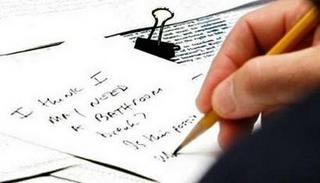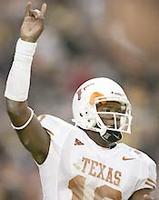An
absolutely riveting piece could be found in Sunday's New York Times Magazine. It describes the author's look back at his own past as an evangelical (subtitling it
My long-lost years as a teenage evangelical) through the lens of a new encounter with it at the recent
Billy Graham crusade in New York City.
The story was extremely well-written and moved me in several distinct ways. It was sad, angry, hopeful, and melancholy. Mostly, though, I felt sadness. The author, a
University of Chicago professor, was to me still searching. He seeks answers to life's deepest questions. He seems to act as a skeptic to shield himself from his own doubt over what is truth. I cannot suggest that you read the article enough for the simple fact that it will lead you to your own thoughts on Truth.
I would, however, like to go through a couple sections of it here and share the thoughts I have. Sit back, take a deep breath, and here's one Christian's perspective on the article.
The author begins by telling the story of his conversion.
Within a few months, I considered myself "saved".
He goes on to say,
Conversion stories are slippery things. "I once was lost, but now am found" - that's never the whole story, and it's usually not the end of the story. It wasn't for me.
A bit of foreshadowing. He goes on,
...But the thirst for knowledge isn't limited to those who attend the right schools. The caricature of American evangelicals as incurious and indifferent to learning is false. Visit any Christian bookstore and you will see that they are gluttons for learning - of a certain kind... If anything, it is their thirst for knowledge that undoes them. Like so many Americans, they know little about history, science, secular literature or, unless they are immigrants, foreign cultures. Yet their thirst for answers to the most urgent moral and existential questions is overwhelming. So they grab for the only glass in the room: God's revealed Word.
And further,
A half-century ago, an American Christian seeking assistance could have turned to the popularizing works of serious religious thinkers like Reinhold Niebuhr, Paul Tillich, John Courtney Murray, Thomas Merton, Jacques Maritain and even Martin Buber and Will Herberg. Those writers were steeped in philosophy and the theological traditions of their faiths, which they brought to bear on the vital spiritual concerns of ordinary believers - ethics, death, prayer, doubt and despair. But intellectual figures like these have disappeared from the American landscape and have been replaced by half-educated evangelical gurus who either publish vacant, cheery self-help books or are politically motivated. If an evangelical wants to satisfy his taste for truth today, it's strictly self-service.
And I can see now how this state of affairs breeds a narrow fanaticism.
Whoah! This is where I felt some frustration. What of
Ravi Zacharias,
John Piper,
J.I. Packer, and
Millard Erickson? And how about even
C.S. Lewis or
Francis Schaeffer? Had they nothing to say? Can theology be worthless if it's a "half-century" old? First of all, isn't God's Word where every Christian should turn first? And secondly, it is unfair to say that new Christian thought is vacant when that is so obviously not the case; there are many examples of people who are fully educated, who write books that are neither "cheery self-help" or "politically motivated."
Back and forth the author moves from his past to the Billy Graham crusade.
As banal as Billy's punch line is, I am reminded of its power... The Billy Graham Evangelistic Association Web site reports that during the three-day New York crusade, more than 8,700 "inquirers" came forward, hoping to be born again.
And this cannot be denied. However simplistic, false, or odd these crusades seem to many in society, there are thousands who find them exactly what they need.
But back to the story...
There are deeper forces at work: the yearning for truth, for love and, more elusively, for rebirth.
These are powerful forces, and they can also lead a soul out of faith, as they eventually did with me.
I sincerely feel that if someone is seeking THE truth, they will find it. Sadly, I don't think the author has.
After a few months I got myself into a squabble with someone over Scripture, and sat down the next day to study the verses my adversary had marshaled against me. To my surprise, I concluded he was right about what the Bible said. But in my heart I also knew he had to be wrong about the doctrine at hand. Which meant - it was the first time the thought really penetrated my mind - that the Bible might be wrong. My face flushed and I closed the book. It was my first step out of the world of faith and toward the world I live in now.
It seems like the author had a hope for what the Bible stood for. When its truth didn't jive with what his hope was, he walked away. Why was his adversary wrong about the doctrine at hand? Couldn't it have just as well been the author who was wrong? If there was an obvious error, why isn't it documented along with the other scripture shared?
And finally,
I ask whether he went forward during the altar call, and to my surprise I learn he did. Why? "Because," he says, shrugging, "what he was saying tonight made so much sense."
I found it hard to conceal my bafflement, since Billy had not said much at all. You must be born again - that was it. I felt a professorial lecture welling up in my throat about the history and psychology of religion. I wanted to expose him to the pastiche of the biblical text, the syncretic nature of Christian doctrine, the church's ambiguous role as incubator and stifler of human knowledge, the theological idiosyncrasy of American evangelicalism. I wanted to warn him against the anti-intellectualism of American religion today and the political abuses to which it is subject. I wanted to cast doubt on the step he was about to take, to help him see there are other ways to live, other ways to seek knowledge, love, perhaps even self-transformation. I wanted to convince him that his dignity depended on maintaining a free, skeptical attitude toward doctrine. I wanted. . .to save him.
And here we reach the punch line. In a marvelous article, written as if it were neutral, the author leaves no doubt as to what
he thinks. This "Christian doctrine" cannot be true. Somehow there is a perceived anti-intellectualism about evangelicalism. For it is obvious that something that doesn't agree with the latest cutting-edge postmodern thought must be wrong. For what is new is right and truth cannot be found in the past. At least that is what he would have us think.
But what's the real story here? Could it be that there is hurt in his past? No doubt life hasn't been easy. Yes, the church may have let him down. The "adversaries" he faced may have been unloving. Yes, they too were likely imperfect. You know what they say, though; We cannot judge a faith by its worst follower.
I challenge Mark Lilla to continue to seek truth. If he earnestly is, he will find it. Hey, I'd love to get together and have lunch-- as one Chicagoan to another and just sit and visit and seek to find it together.
John 8:32





